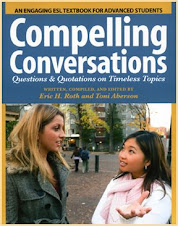Thursday, September 25, 2008
California Immigrants Are Learning English - and Want to Speak English Better!
A recently released Census Bureau report, based on the 2007 Census information, shows that – shock, shock – immigrants overwhelmingly want to improve their English skills. It also shows that a slight majority (51%) of immigrants in Los Angeles claim that they can speak English fluently – an increase from just a few years ago. The study also notes that 88% of immigrant children claim to speak English – and want to learn more.
Yesterday’s Los Angeles Times editorial “Speak English? Yes, more immigrants do “ provides a solid introduction to the heated debate over language and immigration in California. The editorial also argues that immigration reform should include a provision to keep families united so the American children of illegal immigrant parents are not separated from their parents. Finally, the editorial concludes that both the United States and the English language continue to evolve and Americans should embrace change.
The fine editorial, however, could and should have called for both expanding and improving the quality of public education programs so immigrants – including adult immigrants - can learn English quicker. A better Census report also would have included the legal status of immigrants and gone beyond self-reported data by immigrants with evolving language skills.
The editorial’s strong, humane conclusion is worth repeating verbatim:
“American culture grows and adapts as new immigrants redefine it over the generations, and the same can be said of the English language. We should embrace that evolution, not hold it at bay with false and alarmist arguments about the threat to American values.”
Los Angeles Times, September 24, 2008 editorial
Doesn’t that sound sane and civilized?
Ask more. Know more. Share more.
Create Compelling Conversations.
Visit www.CompellingConversations.com
Friday, September 5, 2008
A new semester, new English students, and new forms
As a new semester begins, I face the familiar task - and pleasure - of selecting new materials and creating new forms for my oral skills class. One goal is to have students use the internet more; another to provide more opportunities for peer feedback on oral presentations.
Although I do not have a conversation class this semester, I do teach a high intermediate oral skills class that focuses on academic presentations. The students come from several Asian countries and are all graduate students - almost exclusively in engineering. Workplace surveys continue to identify communication skills, including speaking skills, as a top priority for employers - especially in engineering!
The class will include several informal, short presentations in addition to the longer, more formal presentations that receive a grade. Whenever possible, I prefer to give students to receive fairly immediate feedback, from their peers and me, on their presentations. Students, as a result, will read peer evaluations from the entire class after giving a short presentation like a product review, extended definition, or process description. To be effective, the form must be both simple and open… with some guidance. This collective feedback often validates instructor comments and prepares students to view their videotaped presentations in a more objective manner.
Here is my new form for peer evaluations of oral presentations.It emphasizes the positive aspects, inquires about what can be improved, allows more detailed observations, and provides a simple rating system. I have used a similar format with my engineering communication courses and expect that it will work in my ESL class too. Time will tell.
Feel free to copy, modify, or share the form to fit your ESL/EFL/speech classroom needs.
————————————————————————————-
STUDENT: ____________________________________________________
TOPIC: ____________________________________________________
PEER: ____________________________________________________
GOOD TO SEE:
POINTS TO WORK ON:
BEST PART:
WEAKEST PART:
OTHER OBSERVATIONS/TIPS:
Please circle the appropriate overall rating:
1 2 3 4 5 6 7 8 9 10
Ask more. Know more. Share more.
Create Compelling Conversations.
Visit www.CompellingConversations.com
Sunday, July 20, 2008
Volume Matters
During classroom discussions in English class, some students to will boldly speak their mind. Other students tend to hold back, offer only the safest comments, and other share their wit. One overlooked, essential quality to speech in class, however, is volume. Students must speak loud enough that their fellow students can hear them - whether seated in the front or back row.
One can, however, sympathize with the timid English students who speak softer than ideal in a large classroom.
Being inaudible, however, in personal conversations remains a far more serious problem - especially for English as a Second Language (ESL) students.
Student conferences, especially with shy students worried about their grade or academic performance, can often be a bit awkward for both the professor and student. ESL (English as a Second Language) students, sometimes insecure about their pronunciation or vocabulary, can feel particularly anxious. ESL and other English teachers have to find ways to reduce student anxiety, provide a safe place for English students to speak, provide feedback on student work, and uphold academic standards. (Adult education, by the way, would be greatly improved if ESL teachers had more opportunities for student conferences.)
In general, I find student conferences very productive and satisfying because you get a chance to really work with a college student on their writings and assignments. I often feel that I learn as much as I teach in these 20-30 minute student conferences.
Sometimes, however, I have awkward conferences. If the student has plagiarized, then this can’t be avoided. Those moments, which I dread, can not be avoided. So it goes.
Yet sometimes, as occurred last semester, an ESL (English as a Second Language) student is so shy, so timid, and so unsure that they speak so softly that I can’t even hear. Sometimes I lean forward and ask them to please speak a bit louder. If a student continues in the same low volume, I might apologize for my poor hearing and again request they speak up. What does one do on the third request?
“Please speak a bit louder so I can hear you.”
Was this too direct? I wanted to say, “If I can’t hear you, you will be misunderstood. I want to understand you. Speak up!!”
Patience, this time, paid off. The student raised her voice to an audible level, and replied, “okay.”
“Good to hear you,” I replied. We proceeded to have a productive end of semester conference.
English and ESL teachers at all levels, from elementary school and high school to adult school and university, need to emphasize the importance of student speech being comprehensible. That includes speaking loud enough that conversation partners, classmates, and instructors can hear.
Bottomline: students must speak up in conversations, conferences, and class discussions. Volume matters.Ask more. Know more. Share more.
Create Compelling Conversations.
Visit www.CompellingConversations.com
Friday, July 18, 2008
What is a lifequake? Is that a real word?
Earthquakes remain a concern for people living in many places, including Southern California. This awareness, and fear of sudden shaking and buildings falling, enters into many conversations.
I recently read a wonderful term and vocabulary word: lifequake. What does it mean? An event that suddenly changes your life – a car accident, being laid off, terrible illness, or getting divorced – in the same dramatic way that an earthquake might destroy a building.
Now I have a new way to ask friends to share more about awkward situations.
- How did you deal with that lifequake?
- What lifequakes have you survived?
- How will you manage that lifequake?
Is lifequake a real word? Can educated English speakers use it? Absolutely. New words and slang terms enter English dictionaries all the time, partly because our world continues to change and evolve. Lifequake clearly describes a common experience. It's pithy and practical. While I would might hesisitate about using the term on a TOEFL or TOEIC test, I plan to incorporate into my daily vocabulary with family, friends, and students.
A fellow ESL teacher and longtime California resident believes that “lifequake” was a widely used term in the 1970s among “young, hip people.” Perhaps. Whether old hipster slang or a new Californian term, lifequake conveys an understanding that sometimes life can shock and hurt. Lifequake is a fast way to communicate a harsh reality. Lifequakes happen.
Don't you agree?
Ask more. Know more. Share more.
Create Compelling Conversations.
Visit www.CompellingConversations.com
Monday, May 12, 2008
Choosing to Speak English Opens Doors
For better or for worse, knowing English makes life easier and better. For instance, the ability to speak English allows individuals to communicate with millions of other people from around the world. Some globalization critics and ethnic nationalists, especially in smaller countries, have attacked English as subverting national and group identities. English speakers tend to be the more educated, more affluent, and more successful individuals in several developing countries. This fact apparently offends many people, including a surprisingly number of ESL teachers, who feel seeking worldly success, money, status, or an international spouse is elitist.
You will also find a rich literature on the use of English in advertisements in non-English speaking countries for the same reasons. Modern technological products and companies, such as LG, advertise in
Attacking the prevalence of English remains popular, and questioning the "morality" of choosing to speak English in some academic circles. This obsession seems misguided and ironic. As English teachers and tutors, we need to carefully assess the full range of aspirations and skills that our students as we choose and develop materials. But assessing does not mean judging them! A teacher should support the legal goals of their students.
If our students need a certain score on a standardized exam (TOEFL, TOEIC, citizenship), we need to choose appropriate materials to meet their immediate goals – including active skills like speaking and writing. The new TOEFL, by the way, is a huge improvement over the old, grammar-focused one used for decades. Speaking has been recognized as a vital life skill.
Yet we also need to help students develop authentic language skills that transcend immediate test scores. Many administrators, for understandable reasons, attempt to force all instruction toward standardized tests. Many English instructors feel that standardized test scores have displaced traditional educational goals. Professor Charles Talcott, for instance, has passionately argued against “The Tyranny of Standardized Testing in English Language Classrooms.”
How many times have you encountered ESL students who have collected impressive test scores yet struggled to express themselves in a simple conversation in English? Students need the chance to develop their conversation skills – in and out of the classroom. Listening and speaking remain essential skills so students can express themselves – even be themselves – in English.
English, an optional language for a majority of the globe, remains a smart choice for our students. They have chosen to be English language learners. Compelling Conversations: Questions and Quotations on Timeless Topics helps English language learners go from students to authentic speakers. Speaking English opens many doors. Can you think of a door you would like to open for your students?





